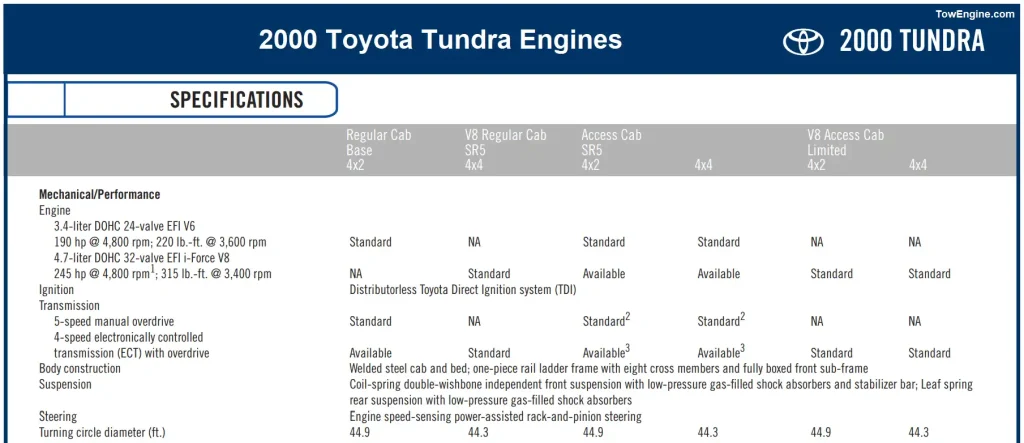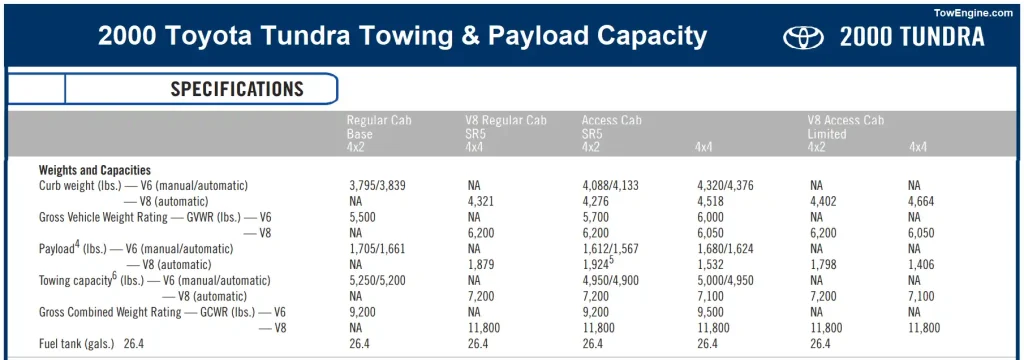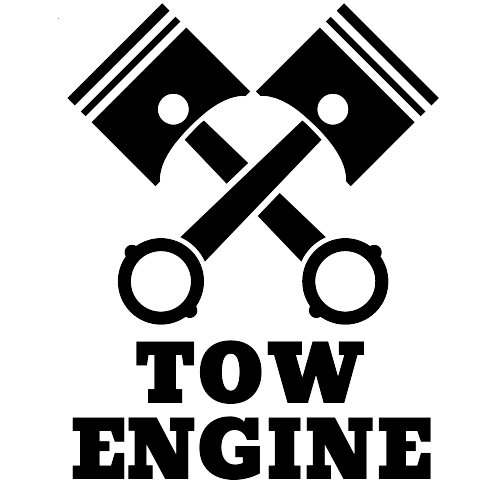2000 Toyota Tundra Towing Capacity & Payload (Charts)
Are you looking for detailed information on the towing and payload capacities of your 2000 Toyota Tundra? Look no further, as we’ve got you covered.
We will discuss the vehicle’s trims, engine types, towing package, and payloads, as well as its capability for 5th wheel and gooseneck towing, GCWR, and GVWR.
By the end of the article, you will have a comprehensive understanding of the 2000 Toyota Tundra’s towing and payload capacities, which will enable you to make informed decisions when planning trips and carrying loads.
The 2000 Toyota Tundra has a maximum Towing Capacity between 4,800 lbs to 7,200 lbs. and a maximum payload capacity of 1,924 lbs. These capacities can vary depending on factors such as the vehicle’s Curb Weight, Gross Vehicle Weight Rating (GVWR), drive, engine, and other factors.
2000 Toyota Tundra Towing Capacity and Payload Capacity Chart
| Engines | Max Towing Capacity | Max Payload Capacity | GCWR | GVWR |
|---|---|---|---|---|
| 3.4-Liter V6 | 5,250 lbs. | 1,705 lbs. | 9,200 lbs. | 6,000 lbs. |
| 4.7-Liter V8 | 7,200 lbs. | 1,924 lbs. | 11,800 lbs. | 6,200 lbs. |
This table shows the different configurations of the 2000 Toyota Tundra and their corresponding payload capacity and towing capacity along with the maximum GVWR.
As you can see, the 3.4-Liter V6 provides a maximum towing capacity of 5,250 lbs. and the 4.7-L-Liter V8 engine provides a maximum towing capacity of 7,200 lbs.
However, the 4.7-Liter V8 engine offers a slightly higher payload capacity of 1,924 lbs., compared to the 1,705 lbs. payload capacity of the 3.4-Liter V6 engine.
When it comes to GCWR, the 4.7-Liter V8 engine offers a slightly higher GCWR of 11,800 lbs., compared to the 9,200 lbs. GCWR of the 3.4-Liter V6 engine.
It is also crucial to remember that the total weight of the vehicle and the trailer should not surpass the Gross Combined Weight Rating (GCWR) specified for the Toyota Tundra.
Here I’ve collected all the 2000 Toyota Tundra towing and payload capacity information from the official Toyota resources that include the 2000 Toyota Tundra Brochure and 2000 Toyota Tundra.
Table of Contents
- 2000 Toyota Tundra vs. Competitors Towing Capacity
- 2000 Toyota Tundra Overview
- Towing Capacity By Engines
- Towing Capacity By Cabs
- Payload Capacity
- Towing and Payload Capacity Chart (Combined)
- What is Curb Weight?
- Factors Affecting Towing and Payload Capacities
- 2000 Toyota Tundra 5th Wheel/Gooseneck Towing
- Maximum Tongue Load of Toyota Tundra
- Useful Resources
2000 Toyota Tundra Overview
When it comes to versatility and customization, the 2000 Toyota Tundra stands out with its array of bed sizes, cab configurations, and engine options.
This popular pickup truck offers the perfect combination of power, performance, and style to meet your specific needs.
Cab Configurations for Your Comfort and Convenience:
The 2000 Toyota Tundra also caters to your preferences with two cab configuration options: the Regular Cab and the Access Cab.
Power-Packed Engine Options:
Performance is a key consideration when selecting a pickup truck, and the 2000 Toyota Tundra doesn’t disappoint. With two available engine options – a 3.4 L V6 and a 4.7 L V8 – you can opt for the power, torque, and efficiency that best suits your needs.

2000 Toyota Tundra Trim Levels and Configurations:
The 2000 Tundra is available in three distinct trim levels: Base, Limited, and SR5.
Each trim offers a unique blend of features and options, including different bed sizes, cab sizes, and available engine configurations.
Towing Capacity By Engines
The 2000 Toyota Tundra offers two engine choices for its towing capabilities – the 3.4 L V6 engine and the I-FORCE 4.7 L V8 engine.
| Engines | Max Towing Capacity | Max Payload Capacity | GCWR | GVWR |
|---|---|---|---|---|
| 3.4-Liter V6 | 5,250 lbs. | 1,705 lbs. | 9,200 lbs. | 6,000 lbs. |
| 4.7-Liter V8 | 7,200 lbs. | 1,924 lbs. | 11,800 lbs. | 6,200 lbs. |
Let’s take a closer look at the specifications and capacities of each engine!
3.4L V6 Engine Towing & Payload Capacity
The base engine for the 2000 Toyota Tundra is a 3.4-Liter aluminum V6 DOHC 24-valve engine with Dual Independent Variable Valve Timing with intelligence (VVT-i).
Producing 190 horsepower at 4,800 rpm and 220 lb.-ft. of torque at 3,600 rpm, this engine is an excellent choice for daily driving and light-hauling tasks.
Equipped with the proper towing package, a Tundra fitted with the 3.4L V6 engine can achieve a maximum towing capacity of up to 5,250 lbs. and a maximum payload capacity of up to 1,705 lbs.
Keep in mind that attaining the maximum towing capacity necessitates the inclusion of a towing package.
4.7L i-FORCE® V8 engine Towing & Payload Capacity
For those who need a bit more power, the 2000 Toyota Tundra also offers a 4.7-liter aluminum i-FORCE V8 DOHC 32-valve engine.
Equipped with Dual Independent Variable Valve Timing with intelligence (VVT-i), this powerhouse delivers 240 horsepower at 4,800 rpm and 315 lb.-ft. of torque at 3,400 rpm.
When properly equipped, a Tundra with the 4.7L V8 engine can achieve a maximum towing capacity of 7,200 lbs. and a maximum payload capacity of 1,924 lbs.
This impressive performance allows you to handle a variety of trailers, boats, and other heavy-duty equipment with ease.
Towing Capacity By Cabs
The 2000 Toyota Tundra offers cab choices to cater to different needs and preferences: Access Cab and Regular Cab.
Each cab option comes with its own set of configurations, engine sizes, payload capacities, and towing capacities.

Now, we’ll delve into each cab option and break down its features to provide easy-to-digest information.
2000 Toyota Tundra Towing Capacity REGULAR CAB:
When it comes to the 2000 Toyota Tundra Regular Cab, you’ll find that it offers a perfect blend of functionality and performance.
With a choice of two engine sizes, the 3.4L V6 and 4.7L V8, this configuration provides ample power for your towing and payload needs.
2000 Toyota Tundra Regular Cab Key Features:
- Cab Size: Regular
- Engine Sizes: 3.4L V6 and 4.7L V8 available
- Maximum Payload Capacity: 1,879 lbs.
- Maximum Towing Capacity: 7,200 lbs. when properly equipped
Below is a detailed chart showcasing the towing and payload capacities of the 2000 Toyota Tundra Regular Cab, based on the engine, cab size, transmission, and drive type:
| Engine | Drive | Cab Size | Transmission | Towing Capacity (lbs) | GCWR (lbs) |
|---|---|---|---|---|---|
| 3.4 L V6 | 4×2 | Regular Cab | Automatic | 5,200 | 9,200 |
| 3.4 L V6 | 4×2 | Regular Cab | Manual | 5,250 | 9,200 |
| 4.7 L V8 | 4×4 | Regular Cab | Automatic | 7,200 | 11,800 |
As illustrated in the table, the 2000 Toyota Tundra Regular Cab’s towing capacity ranges from 5,200 lbs. with the 3.4L V6 4×2 configuration to a maximum of 7,200 lbs. with 4.7L V8 4×2 configuration when properly equipped.
The Gross Combined Weight Rating (GCWR) varies from 9,200 lbs. for the 3.4L V6 4×2 options to 11,800 lbs. for the 4.7L V8 4×4 configurations.
2000 Toyota Tundra Towing Capacity ACCESS CAB:
The Access Cab is a four-door cab configuration offered on the Toyota Tacoma. It has a shorter wheelbase and narrower track.
With a choice between the 4.7L V8 and 3.4L V6 engines, this configuration caters to various towing and payload needs.
2000 Toyota Tundra Access Cab Key Features:
- Cab Size: Access Cab
- Engine Sizes: 4.7L V8 and 3.4L V6 available
- Maximum Payload Capacity: 1,840 lbs.
- Maximum Towing Capacity: 7,200 lbs. when properly equipped
Below is a detailed chart showcasing the towing and payload capacities of the 2000 Toyota Tundra Access Cab, based on the engine, cab size, transmission, and drive type:
| Engine | Drive | Cab Size | Transmission | Towing Capacity (lbs) | GCWR (lbs) |
|---|---|---|---|---|---|
| 3.4 L V6 | 4×2 | Access Cab | Manual | 4,950 | 11,800 |
| 4.7 L V8 | 4×2 | Access Cab Limited | Automatic | 7,100 | 11,800 |
| 3.4 L V6 | 4×4 | Access Cab | Automatic | 4,950 | 11,800 |
| 3.4 L V6 | 4×2 | Access Cab | Automatic | 4,900 | 11,800 |
| 4.7 L V8 | 4×2 | Access Cab | Automatic | 7,200 | 11,800 |
| 3.4 L V6 | 4×4 | Access Cab | Manual | 5,000 | 11,800 |
| 4.7 L V8 | 4×4 | Access Cab | Automatic | 7,100 | 11,800 |
| 4.7 L V8 | 4×4 | Access Cab Limited | Automatic | 7,200 | 11,800 |
| 4.7 L V8 | 4×4 | Access Cab | Automatic | 7,100 | 11,800 |
As seen in the table, the 2000 Toyota Tundra Access Cab’s towing capacity ranges from 4,900 lbs. to a maximum of 7,200 lbs. with the 4.7L V8 4×2 configurations when properly equipped.
The Gross Combined Weight Rating (GCWR) for the 4.7L V8 is 11,800 lbs. for all configurations.
Payload Capacity
Firstly, let’s define what we mean by “payload capacity.”
Payload capacity is the total weight that a vehicle can safely carry, including passengers, cargo, and any accessories or modifications.
It’s important to note that payload capacity is not the same as towing capacity, which refers to the amount of weight that a vehicle can tow behind it.
The 2000 Toyota Tundra has a respectable payload capacity, with the ability to carry up to 1,924 pounds.
However, it’s worth noting that this number can vary depending on the specific model and configuration of the truck.
Let’s take a closer look at the different options available for the 2000 Toyota Tundra and their respective payload capacities.
2000 Toyota Tundra Payload Capacity REGULAR CAB:
The maximum payload capacity for the 2000 Toyota Tundra Regular Cab is 1,879 pounds for the 4.7L 4×2 engine and an automatic transmission.
This means that the truck can safely carry up to 1,879 pounds of cargo in the bed. If you try to load more than 1,879 pounds of cargo in the bed, you could damage the truck or cause an accident.
| Engine | Cab Size | Transmission | Payload Capacity (lbs) | Curb Weight (lbs) | GVWR (lbs) |
|---|---|---|---|---|---|
| 3.4 L 4×2 | Regular Cab | Automatic | 1,661 | 3,839 | 5,500 |
| 3.4 L 4×2 | Regular Cab | Manual | 1,705 | 3,795 | 5,500 |
| 4.7 L 4×4 | Regular Cab | Automatic | 1,879 | 4,262 | 6,200 |
The table also shows the curb weight and GVWR of the truck.
The 2000 Toyota Tundra Regular Cab is a great truck for people who need a truck with a lot of payload capacity.
The truck has a maximum payload capacity of 1,924 pounds, which is more than most other trucks in its class.
2000 Toyota Tundra Payload Capacity Access Cab:
The maximum payload capacity for the 2000 Toyota Tundra Access Cab is 1,924 pounds.
This is for a 4.7 L V8 engine, automatic transmission, and 4×4. The minimum payload capacity is 1,406 pounds. This is for a 4.7 L V8 engine, automatic transmission, 4×4, and Limited trim.
| Engine | Cab Size | Transmission | Payload Capacity (lbs) | Curb Weight (lbs) | GVWR (lbs) |
|---|---|---|---|---|---|
| 3.4 L 4×2 | Access Cab | Manual | 1,612 | 4,088 | 5,700 |
| 3.4 L 4×2 | Access Cab | Automatic | 1,567 | 4,133 | 5,700 |
| 4.7 L 4×2 | Access Cab | Manual | 1,924 | 4,276 | 6,200 |
| 4.7 L 4×2 | Access Cab | Automatic | 1,800 | 4,400 | 6,200 |
| 4.7 L 4×4 | Access Cab | Manual | 1,512 | 4,518 | 6,030 |
| 4.7 L 4×2 | Access Cab Limited | Automatic | 1,798 | 4,725 | 6,200 |
| 4.7 L 4×4 | Access Cab SR5 | Automatic | 1,924 | 4,276 | 6,010 |
| 4.7 L 4×4 | Access Cab Limited | Automatic | 1,406 | 4,685 | 6,200 |
The 2000 Toyota Tundra Access Cab is a good choice for people who need a truck with a large payload capacity.
It’s important to note that exceeding the GVWR can be dangerous as it puts extra strain on the vehicle’s suspension, brakes, and other components.
Towing and Payload Capacity Chart (Combined)
| Engine Type | 3.4L V6 | 3.4L V6 | 4.7L V8 | 4.7L V8 | |
| Drive | 4×2 | 4×4 | 4×2 | 4×4 | |
| Curb Weight | Regular Cab Base Manual | 3,795 | – | – | – |
| Curb Weight | Regular Cab Base Automatic | 3,839 | – | – | – |
| Curb Weight | Regular Cab SR5 Automatic | – | – | – | 4,262 |
| Curb Weight | Access Cab SR5 Manual | 4,160 | 4,205 | – | – |
| Curb Weight | Access Cab SR5 Automatic | 4,320 | 4,376 | 4,400 | 4,725 |
| Curb Weight | Access Cab LTD Automatic | – | – | 4,276 | 4,664 |
| GVWR | Regular Cab Base | 5,500 | – | – | – |
| GVWR | Regular Cab SR5 | – | – | – | 6,200 |
| GVWR | Access Cab SR5 | 6,000 | 6,000 | 6,200 | 6,200 |
| Payload Capacity | Regular Cab Base Manual | 1,705 | – | – | – |
| Payload Capacity | Regular Cab Base Automatic | 1,545 | – | – | – |
| Payload Capacity | Regular Cab SR5 Automatic | – | – | – | 1,710 |
| Payload Capacity | Access Cab SR5 Manual | 1.612 | 1,565 | – | – |
| Payload Capacity | Access Cab SR5 Automatic | 1,567 | 1,520 | 1,924 | 1,475 |
| Payload Capacity | Access Cab LTD Automatic | – | – | 1,924 | 1,525 |
| Towing Capacity | Regular Cab | 5,250 | – | – | 7,200 |
| Towing Capacity | Access Cab | 4,800 | 4,800 | 7,100 | 6,900 |
| Max. Tongue Load | Regular Cab | 500 | – | – | 720 |
| Max. Tongue Load | Access Cab | 480 | 180 | 710 | 690 |
| GCWR | 9,200 | 9,500 | 11,800 | 11,800 |
What is Curb Weight?
The curb weight and gross vehicle weight rating (GVWR) also vary based on the configuration.
It’s also worth noting that curb weight plays a role in determining a vehicle’s payload capacity.
Curb weight refers to the total weight of the vehicle without any passengers or cargo.
The higher the curb weight, the less payload capacity the vehicle will have.
Not sure about your Toyota specs? Try out this VIN Decoder to find out or read more about How to Find a VIN Number.
Factors Affecting Towing and Payload Capacities
The towing and payload capacities of a vehicle can be influenced by several factors, including:
- Engine: Different engines produce varying amounts of power and torque, which affect a vehicle’s overall capabilities.
- Drive: The type of drive (4×2 or 4×4) impacts the towing and payload capacities due to the differences in the drivetrain and suspension components.
- Curb Weight: The weight of the vehicle without passengers or cargo, which can impact its capabilities.
- Gross Vehicle Weight Rating (GVWR): The maximum weight a vehicle can safely carry, including the curb weight, passengers, and cargo.
- Gross Combined Weight Rating (GCWR): The maximum combined weight of the vehicle, passengers, cargo, and any towed load.
2000 Toyota Tundra 5th Wheel/Gooseneck Towing
The 2000 Toyota Tundra is a capable truck that can tow a variety of trailers, including fifth wheels and goosenecks.
The maximum towing capacity for the Tundra varies depending on the engine and drivetrain, but it can be as high as 7,200 pounds.
When towing a fifth wheel or gooseneck, it is important to make sure that the truck is properly equipped.
The Tundra comes standard with a receiver hitch, but a heavier-duty hitch may be required for larger trailers. It is also important to make sure that the truck has the proper cooling system and brakes.
Here are some tips for towing a fifth wheel or gooseneck with a 2000 Toyota Tundra:
- Make sure the truck is properly equipped.
- Load the truck and trailer properly.
- Be familiar with the trailer’s weight and dimensions.
- Use caution when backing up the truck and trailer.
- Get training on how to tow a fifth wheel or gooseneck.
By following these tips, you can safely and confidently tow a fifth wheel or gooseneck with your 2000 Toyota Tundra.
To determine the maximum trailer weight, you need to find the Gross Combined Weight Rating (GCWR) which is the maximum allowed tow rating of the vehicle weight and the trailer weight combined.
Subtracting the Gross Vehicle Weight (GVW) of the truck from the GCWR will give you the maximum Gross Trailer Weight (GTW) that can be safely towed.
The information tag located inside the driver door jamb provides this information.
Overall, the towing capacity of the 2000 Toyota Tundra is dependent on several factors, including the options and the trailer weight.
It is important to determine the maximum GTW and to choose the appropriate 5th Wheel/Gooseneck and base rails for a safe and successful towing setup.
Maximum Tongue Load of Toyota Tundra
If you’re planning on towing a trailer with your Toyota Tundra, it’s important to know the maximum tongue load that your vehicle can handle.
The tongue load is the amount of weight/force that the trailer tongue exerts on the trailer hitch and it’s crucial to stay within the recommended limits to ensure safe and efficient towing.
So, what is the max tongue load of a Tundra? Well, according to Toyota, for all of their engines, a tongue weight of 10-11% should not be exceeded.
For example, if the trailer’s gross weight is 6,000 lbs, the tongue weight should not exceed 600 lbs.
It’s also worth noting that you should not tow above 1000 lbs on any 2000 Tundra without a trailer with a braking system.
Additionally, if you plan on towing a trailer weighing over 5,000 lbs, you’ll need to use a weight-distributing hitch.
One method involves using a specialized scale that measures the weight directly from the hitch ball.
Useful Resources
Explore Capacities by Vehicle Make

